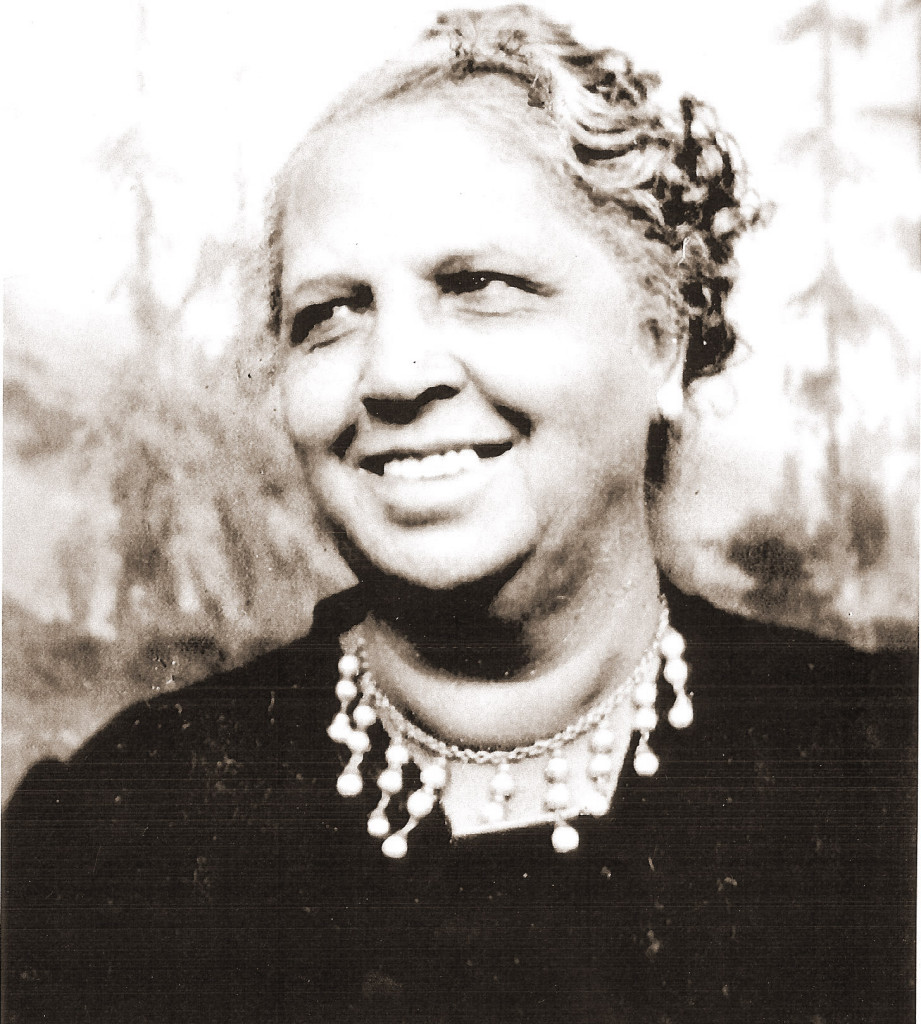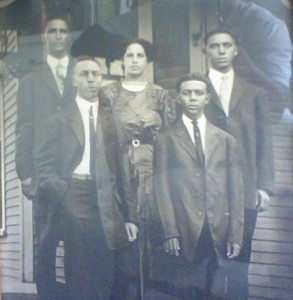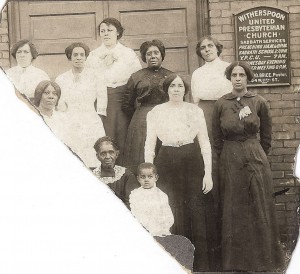Josephine “Josie” Cleage was my grandfather Albert B. Cleage’s older sister and today I will tell what I have learned about her.
Josephine Cleage, who was always called Josie, was born in 1873 in Louden County, Tennessee. She was the first child of Louis and Celia (Rice) Cleage. In the early years, Louis worked on a farm and Celia kept house. Eventually there were four younger brothers – Henry, Jacob, Edward and Albert. Josie’s father Louis was remembered as a drinker who didn’t always bring his pay home. He started working on the railroad and several years later her parents went their separate ways.
In September 1894, twenty year old Josie married 22 year old James Cleage. Although they were both named Cleage, it was not because they were related. Josie’s family was enslaved on Alexander Cleage’s plantation while James Cleage’s family was enslaved on David Cleage’s plantation. James’ parents were Jerry Cleage and Charlotte Bridgeman. You can read more about them here -> Jerry Cleage and Charlotte Bridgeman and here -> Jerry Cleage, A Slave for Life
Both were born after the Civil War. Their first daughter, Henrietta was born in 1897 with second daughter Lucille following in 1899.
In April of 1897 Josie’s mother, Celia, married her second husband William Roger Sherman of Athens, Tennessee. By 1900 the whole family was living in Athens. Josie, now 27, and her family were living next door to her mother, step-father and brothers. Husband James, 29 was teaching school. According to the 1900 census Josie was able to read and write.
Sometime after 1890 Jacob Lincoln Cook, founded the Athens Academy. James Cleage was one of the small group of dedicated educators that worked with him and taught there in the early years. In 1900 J.L. Cook was appointed president of Henderson Normal Institute in Henderson, North Carolina. James also went to North Carolina and began teaching at the Institute. In 1901 Josie and James first son, James Oscar, was born there. My grandfather, Albert, lived with his aunt’s family while he was attending high school at Henderson Normal. He graduated in 1902. By the time Albert David (called David) was born in 1907, the family was back in Athens, Tennessee, but not for long.
By 1905 Henry and Jacob Cleage had relocated to Indianapolis, Indiana and in 1908 James, Josie and their growing family joined them there. Their youngest daughter, Hattie Ruth was born in Indianapolis in 1909. James worked a porter and later at a printing shop. Josie stayed home and raised the children and kept the house.
Both James and Josie were active in Witherspoon Presbyterian Church. I found these short items in the Indianapolis Star “News of The Colored Folk” during 1911.
March 11, 1911
Officers of the Witherspoon United Presbyterian Church entertained its members at the church at a banquet Tuesday night. Dr. H.L. Hummons was toastmaster. Addresses were made by Henry and James Cleage, Mrs. Lillian T. Fox and Mrs. M.A. Clark.
April 9, 1911 Sunday
The Witherspoon United Presbyterian Church will give its annual musicale Friday evening at the church on North West street. The following program will be given: Solo, Mrs. T.A. Smythe; reading, Mrs. James Cleage; clarinet solo, Philip Tosch; reading, Mrs. Harriet Mitchel; quartet, Messrs. Lewis, Thompson, Chavis and Thompson. The church choir will render three selections. Mrs. Daisy Brabham has program in charge.
My uncle Henry Cleage remembered family visits to Indianapolis during the summers. He said his Aunt Josie was a real intellectual who read a lot and could talk about a variety of topics. He also remembered catching fireflies and that someone in the family had a goat. My aunt Anna Cleage Shreve remembered her uncle James as a very quiet, gentle man who helped around the house. Uncle Edward’s daughter Juanita Cleage Martin wrote in her memoirs that she remembered her aunt as being tall with a pleasant smile, easy going with a lot of hair.

Josie’s children all finished several years of high school and then got married or started working or both. Lucille seems to have been the first to relocate to Detroit where her uncles Albert, Jacob and Henry settled. After Josie’s husband James A. Cleage died in 1933, Josie also moved to Detroit. In 1940 she was living not far from her brothers with her son David and his family on Stoval.
Josephine Cleage died in July of 1956 at age 82 and is buried in Detroit Memorial Park East Cemetery.



Very interesting about the Cleage families. I knew that families from the plantations often took the names of the plantation owners, but somehow, seeing it written made it more real.
I think seeing it in real life always makes something more real. Sometimes they didn’t take the name of the last owner but of an earlier one. Some made up new names altogether. I know a family that was on Aunt Josie’s husbands side that changed their name from Cleage to Arnwine. Some people took the name of Freeman. It’s a lot easier when you are researching if the ancestors did take the name of the last owner because sometimes you can find records that way.
Here’s something that I thought was interesting. I’ve been doing DNA testing and talked several cousins from both sides of the family into doing it. Unfortunately we have no males descendents in my direct line living among any of the groups, neither maternal side and neither paternal side. I was talking to someone about this and they said that the white line of Cleages has also run out of male descendents.
Like Julie I was taken aback to see the families both had the same surname because they came from the same plantations…makes sense in a way, but strange at the same time. I smiled at the way memory works with your uncle’s reminiscences of Josie…intellectual, a reader, fireflies and a goat! Josie has such a lovely kind face and a gorgeous smile.
Very interesting about the DNA isn’t it..especially that the white Cleages have no male descendants as well.
I should have met her because I was ten when she died and we all lived in Detroit but I guess my grandfather and his siblings had drifted apart because I never met any of them until decades later.
There are male descendants but they were all born to daughters so they don’t carry the name of the surname dna. In my father’s family of 7 siblings of the 4 sons only my father had children and we were both girls. His three sisters all had children, a mix of boys and girls.
What a shame as it limits your discoveries a little. I wish I could be more persuasive with my cousins 🙂 A shame too to have missed out on missing Josie but yes, families do drift apart for whatever reason.
I forgot, I did know Aunt Josie’s son, David and part of his family because he was an active member of my father’s church.
Very interesting about the white Cleage’s have also run out of male descendants. Perhaps the way forward is to research a wider scope – a one name study, almost going forward to go backwards. What do you know of the plantation owners?
I do have quite a bit of information about the Cleages. I even have a few documents – slave bills of sale and a letter to the overseer. I don’t think we are related to the white Cleages, just thought it interesting that the male lines both ran out. You can read a copy of the letter to the overseer here which mentions Josephine’s grandfather and my 2Xs great grandfather, Frank – http://findingeliza.com/archives/4
I agree it is interesting that both male lines ran out. A fascinating document; thanks for sharing that.
I guess my thoughts about researching all the Cleages was to see what similarities there were. Clearly they took the name of the plantation owners, but I wonder if there is a genetic link in their somewhere?
I don’t think there is with this particular line. There is no oral history that there was although there is with several other lines. I tested with 23 and me and keep waiting for someone to show up where we can actual find and document a link. So far no luck. Without a male available from my line I don’t think I can trace back. They do have one last old man in their line. Old man! He may be my age!
Age is just a number, your as young as you feel Kristin!